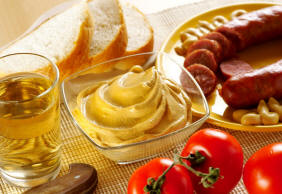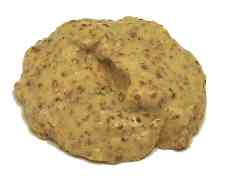|
Your online resource for all things culinary |
|
|||||||||
|
||||||||||
|
||||||||||
|
||||||||||
English Mustard typesThese are made with both white and brown mustard seeds producing a condiment
which is both pungent and hot. Although there are strong German mustards, most of us are more familiar with the mild sweet types, which are made with brown mustards seeds mixed with vinegar and sweetened with brown sugar or honey
|
||||||||||
|
Dijon |
English Mustard Powder |
Whole Grain |
Growing Mustard
Mustard plants like full sun but prefer cooler weather. As they mature in 50 days, succession planting is useful to ensure a constant supply. Sow the seeds from March to June, 6mm/� -inch deep, 7.5cm/3" apart in ordinary garden soil. Once germinated thin the seedlings to 20cm/8-inches apart. Keep well watered and weeded.
Mustard greens can be eaten raw or cooked. Harvest the leaves whilst still young
and tender. picking a few leaves from each plant to ensure continuous cropping
and later flowering which will provide the seeds.
Mustard seeds are ready to be harvested when the plants begin to turn yellow
although you need to leave them as long as possible. However, the pods tend to
explode when fully ripe. Cut the whole stalks halfway up then hang the plants
upside down to dry in a cool, dry place for approximately two weeks. Remove the
seeds from the pods and store in glass jars until ready to use.
Mustard in Cooking
As well as a condiment in its own right most often used as an accompaniment to meats and poultry, mustard can be used as an ingredient in many savoury recipes where it lends an added dimension and sometimes a good kick to the overall flavour.
In mayonnaise,
vinaigrettes and sauces, it has the added benefit of acting as an emulsifier,
binding the water/liquid and oil elements together, which helps stop the sauce
from separating.
As heat destroys much of the flavour of mustard, it's always best to add it late
on in the cooking. Also, it is unnecessary to use expensive mustards when adding
to cooked recipes: reserve these for use as accompaniments on their own.
|
|
Sign up for Free E-mailings |
|
I still haven't found what I'm looking for
Try our search facility. Type in your main ingredient (s) or whatever you happen to have available in your store cupboard or fridge and allow us to whisk you up a recipe in seconds!
For full advanced search tips visit our main search page via the red "search this site" button at the top of the page |
|
About Us | Contact Us | Advertise | Private Privacy | Media Resources | Links | Sitemap | Printing Recipes |
This Web Site was designed and created by Recipes4us.co.uk. Copyright � 2000 to date [Recipes4us] All rights reserved. Some Photos � www.fotolia.co.uk
|




